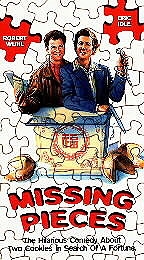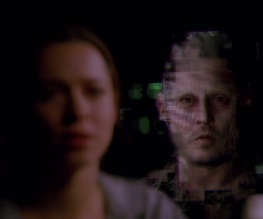Missing Pieces

Twenty-three-year-old Kenton Bartlett is the driving force behind this project, having written, directed and produced all off his own back. The result is a slightly confused, occasionally dull film which is lifted considerably by its peculiar premise, convincing performances and a few very touching moments. Missing Pieces is ultimately a well-crafted, sweet-natured little film with a few neat twists and turns along the way.
The story centres on David (Boone Jr), a man whose brain damage following a car accident has rendered him incapable of relating normally to the world around him, and – most crucially – to his wife, Delia (Walters). Frustrated by the loss of the man she fell in love with, Delia moves out and, in a misjudged attempt to win her back, David resorts to kidnapping two young loners and forcing them together in the hope that they will fall for each other. In short, he’s the world’s most ambitious matchmaker (sorry Cilla).
David assembles an elaborate series of sets, placing bits of old junk in the middle of sprawling panoramic locations such as the Utah salt flats (Bartlett has explained his decision to film outside as a necessity of the small budget which couldn’t stretch to interior lights). David then kidnaps lonely, depressed girl Maggie (Engel), and lonely, depressed boy Daylen (Hassel) and plonks them out in the desert. Upon waking, the two discover a series of written instructions which they are to follow to the letter. They move from location to location, growing closer to one another and ultimately enjoying the experience, but always aware that they are being observed from a distance by their mysterious – but mostly creepy – captor.

The central conceit of this film is that the action is presented via a fragmented, disordered timeline which – as in Christopher Nolan’s psychological mystery Memento – is evidently designed to reflect David’s confused state of mind. Indeed, the whole film is somewhat of a jigsaw to be pieced together by the viewers. And, just to add another layer to the metaphor, Daylen himself is a jigsaw enthusiast (who isn’t?) whose current puzzle is – you guessed it – missing pieces.
The tangling of all these threads together grows a little confusing at times, and the film doesn’t necessarily need such complications. Because where Missing Pieces truly shines is in its exploration of David’s struggle to cope in a world he no longer understands. In his initial attempts to persuade Delia to return, he ends up breaking into the house where she is staying to stash a box of chocolates. Upon her return, she chastises him like a mother explaining why her child’s behaviour is unacceptable. At another point, David wanders into an art gallery and attempts to strike up conversation with a stranger. Expressing a sentiment which most of us could probably sympathise with, David looks around at the artwork on the walls and despairs that he doesn’t understand – on the surface, how he is meant to feel looking at these paintings, but more deeply how the world works. It’s these tragic, poignant touches that bring a real tenderness to the film and enable the viewer to maintain empathy for a central character who is really a bit of a nutter – albeit a well-meaning one.

Missing Pieces is by no means a perfect film. Despite both Maggie’s and Daylen’s loneliness and increasing isolation from the rest of the world, it feels a bit of a stretch to have them both blindly accept their fate when they initially wake up after being kidnapped. And though the fragmented action does for the most part hold your attention, the film feels a little overlong and drags somewhat in the second half. But the performances are strong – particularly from newcomer Daniel Hassel – and for a filmmaker as young as Bartlett, Missing Pieces is an undoubtedly impressive debut.





Recent Comments